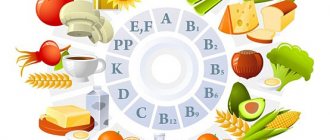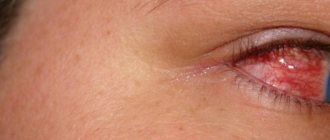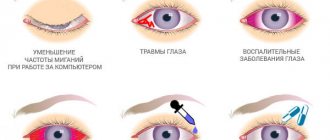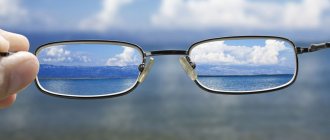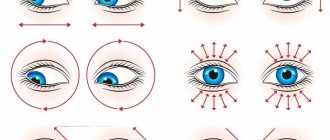Many people experience increased visual stress every day due to prolonged work at the computer, driving a car, etc. Over time, this leads to the development of eye diseases. To maintain vision, it is recommended to consume sufficient amounts of eye vitamins. Let's look at what products contain them.
Currently, it is quite difficult for a person to maintain vision. The work of many modern people involves spending a long time at the computer. Children and teenagers experience eye strain when doing homework, while reading in public transport, or while working with a tablet or smartphone. Additional stress comes from watching cartoons in the evening, as well as non-compliance with a sleep schedule. Over time, the resources of the visual system are depleted, which inevitably leads to a decrease in visual acuity.
The human body is capable of independently restoring its own strength, including maintaining the functioning of all organs. However, this requires proper nutrition, which will allow you to sufficiently receive the vitamins and minerals necessary for the visual system.
They enter the body with food and are well absorbed with a balanced diet - much better than synthetically created vitamin complexes for the eyes and dietary supplements. Often on forums people are interested in what products to improve vision it is advisable to use when creating a menu. Let's take a closer look at this issue.
What vitamins are needed to maintain vision?
To decide which foods are good for vision, you need to study the vitamins our visual system needs to maintain normal functioning. Ophthalmologists say that recently the number of patients with myopia and farsightedness has increased significantly. This is due to constant stress, environmental degradation, excessive stress and unbalanced nutrition. Adults, children and teenagers systematically eat fast food - fast food that does not contain vitamins for vision. What vitamins do our visual system need:
- Riboflavin (B2). Strengthens the capillary network of the eye, improves pupil performance, and also prevents the development of glaucoma and cataracts;
- Vitamin A. One of the most important vitamins for the eyes. It strengthens the cornea, improves visual acuity and is responsible for the ability to see in the dark;
- Thiamine (B1). Normalizes intraocular pressure, improves the condition of the pupil and the transmission of nerve impulses from the brain to the visual system;
- Cyanocobalamin (Vitamin B12). Needed for normal blood circulation in the eyes and stabilization of the functioning of nerve fibers;
- Vitamin C. Used to provide oxygen to the visual organs;
- Lutein. This substance helps strengthen the lens and retina.
Fruits and berries
- Blueberries are one of the most beneficial berries for the eyes. During harvest, you can eat 10 glasses. Blueberries ground with sugar retain all their beneficial properties. The berry contains a large amount of amino acids and vitamins, lutein. All of them protect the eyes from the negative influence of the environment. Blueberries will relieve fatigue; they are especially useful for drivers and programmers.
- Apricots also have a positive effect on eye health.
- Rosehip contains a high concentration of ascorbic acid. If you drink a decoction of berries every day, the strength and elasticity of the eye vessels is restored.
- Hawthorn is great for myopia because it contains a lot of carotene and vitamin C.
- Kiwis and oranges strengthen the vascular walls of the eyes, improve blood circulation in the vessels of the visual organs, reducing the risk of developing diseases.
What foods are good for the eyes: berries and vegetables
The main component of most modern vitamin complexes for the eyes is blueberries. This berry protects the organs of vision from fatigue and overstrain, and also helps maintain the health of the capillaries, through which the eye muscles receive all the useful components. Blueberries contain lutein, anthocyanins, and vitamins A and C. They have antioxidant properties and help improve vision clarity. It is enough to eat 1-2 tablespoons of berries (can be frozen). Some people prefer to eat blueberry jam, which is also very good for the eyes.
Ophthalmologists advise eating as many orange and green vegetables as possible.
For example, carrots, which are rich in many vitamins that are beneficial for the eyes. It contains carotene, which in the human body is converted into vitamin A, which plays an important role in maintaining eye health. You can stew carrots with cream or make a salad. These cooking methods improve the absorption of fat-soluble carotene.
To prevent the occurrence of conjunctivitis and dystrophic eye diseases, it is recommended to eat onions and garlic. Vitamins for vision are also found in white, red and cauliflower. It contains vitamins: C and P, B1, B2, PP, as well as the beneficial substance choline. Broccoli helps support vision thanks to lutein, zeaxanthin and caratine. No less useful is spinach, which holds the record for lutein content. Another useful vegetable for the visual system is pumpkin. It contains zinc, zeaxanthin and lutein, as well as a whole range of vitamins. By eating this product, you can significantly reduce the risk of such a serious eye disease as cataracts. new: C, A, B1 and B2. You can prepare various dishes from it: soups, salads, cereals and even sweet desserts.
What berries and vegetables are good for the eyes:
- Blueberry;
- Carrot;
- Onion and garlic;
- Any cabbage (cauliflower, white cabbage, broccoli, etc.);
- Spinach and other greens (parsley, lettuce);
- Pumpkin.
Proper nutrition as a habit
Many people don’t understand, but the alternation of rich feasts and strict food restrictions, which are inherent in the period before and after the holidays, becomes colossal stress for the body. Throwing from one extreme to another negatively affects both mood and figure, as well as the body’s ability to resist infections. Eating healthier should become a sustainable habit. It is no coincidence that the translation from the Greek word “diet” simultaneously means “diet” and “way of life.”
Below are a few simple recommendations that will help you eat not only tasty, but also healthy:
- It is worth eating often, but in small fractional portions. This will make it possible to forget about overeating.
- It is better to make the basis of your diet whole grains (rice, buckwheat, pasta made from durum flour, bread made from coarse flour). It is advisable to eat vegetables and fruits with every meal.
- Fruits and vegetables can be frozen, fresh or in juice form. Your daily diet should include 3 servings of vegetables, plus 2 servings of fruit.
- It is better to give preference to natural dairy products (whole milk, yoghurt, fermented baked milk, cheese) that do not contain dietary supplements. You can snack on them twice a day.
- Twice a day you can eat meat, poultry, eggs and legumes (beans, lentils, etc.). It is useful to diversify your weekly diet with fish.
- But it is better to limit flour, fatty and sweet foods. Desserts that include fresh berries and fruits are much healthier and tastier.
- As for drinks, it is better to drink more mineral water, herbal infusions and green tea. This drink quenches thirst better, and green tea, among other things, serves as a source of antioxidants.
A diet structured in this way will allow the body to remain healthy until old age and prevent eye diseases.
By contacting the Moscow Eye Clinic, each patient can be sure that some of the best Russian specialists will be responsible for the results of treatment. The high reputation of the clinic and thousands of grateful patients will certainly add to your confidence in the right choice. The most modern equipment for the diagnosis and treatment of eye diseases and an individual approach to the problems of each patient are a guarantee of high treatment results at the Moscow Eye Clinic. We provide diagnostics and treatment for children over 4 years of age and adults.
What other foods are good for vision?
Nutritionists recommend eating fish at least two to three times a week. And ophthalmologists fully support them in this, because fish contains polyunsaturated fats and fatty acids that are necessary for eye health (especially Omega-3). It is recommended to eat 300 grams of this product twice a week.
To maintain vision, it is necessary to include orange and green fruits such as oranges, grapes, apples and peaches in your usual diet. We recommend paying special attention to grapefruit. It contains special substances that help slow down the aging of the eye lenses, as well as vitamins B, C and A, iron, calcium, potassium, manganese, phosphorus and folic acid.
Those who choose products to improve vision and strengthen retinal tissue should pay attention to pistachios. In addition to phosphorus, fats, potassium and fiber, they contain lutein and zeaxanthin, which the body requires for the normal functioning of the visual system. In addition, dark chocolate has been proven to be beneficial for the eyes. Thanks to the presence of flavonoids, it protects blood vessels and strengthens the cornea.
Ophthalmologists also recommend eating healthy dairy products: milk, kefir, yogurt, fermented baked milk and cottage cheese. They contain a large amount of calcium and beta-carotene, which strengthens the membrane of the eyes and prevents the appearance of various refractive errors.
To improve vision, it is advisable to eat:
- Fish;
- Orange and green fruits;
- Black chocolate;
- Pistachios;
- Eggs;
- Dairy products.
Features of products for good vision
Vision restoration products are most often dark green or orange in color. Carotenoids, which are considered powerful antioxidants, give them their orange tint. They maintain visual acuity and prevent the development of eye diseases. Green foods contain zeaxatin and lutein. They protect the lens of the eye from oxidative processes and protect it from free radicals formed in the light.
A decrease in vitamins in the body leads to early deterioration of vision and deformation of the lens. It is advisable to replenish the supply of useful substances using sources of natural origin. It is extremely important to provide a regular nutritious diet. With the help of diet therapy you can achieve the following results:
- maintaining and enhancing visual acuity;
- strengthening blood vessels;
- prevention of cataracts and glaucoma;
- strengthening the eye muscles;
- moisturizing the mucous membrane of the eye;
- protection of the retina from ultraviolet radiation;
- increased color perception.
To increase the effectiveness of products designed to improve vision, you need to perform special exercises. You also need to limit the time you spend at the computer and watching TV. The quality of sleep and the stability of the emotional state are of no small importance in therapy.
If you experience problems with vision, you need to perform special exercises daily aimed at relaxing your muscles!!!
How to keep your eyes healthy?
A balanced diet is the basis for maintaining visual health. However, it is equally important to maintain a sleep schedule and control the amount of visual stress. For those who work at a computer for a long time, ophthalmologists recommend doing eye exercises every 45 minutes. In addition, it is advisable to undergo a systematic examination by an ophthalmologist, since diseases identified in the early stages are much easier to treat. If necessary, the specialist will write a prescription for glasses or contact lenses (for example, Acuvue, Alcon, Adria, etc.), which will help restore clarity of vision.
We recommend that you familiarize yourself with the wide range of products in the Ochkov.Net online store. With us you can profitably order lenses from world brands in just a couple of clicks!
